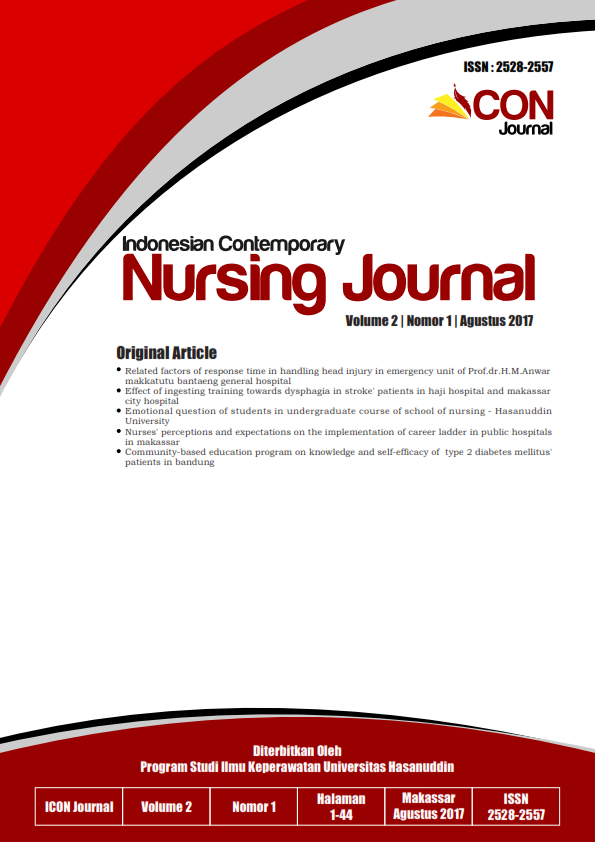Effect of Ingesting Training Towards Dysphagia in Stroke’ Patients in Haji Hospital and Makassar City Hospital
Abstract
Introduction: Stroke is a loss of brain function caused by the cessation of blood supply to the brain. One of the most common clinical disorders of stroke is ingesting or dysphagia. This study aims to identify the effect of ingesting exercise to stroke patients with dysphagia in the General Hospital of Haji General Hospital of Makassar City. Method: The design of this study was pre experimental with One Group Pre-Post Test Design. Samples in this study were all stroke patients with dysphagia with Convenience Sampling technique, obtained 20 respondents. Rehabilitation of ingesting exercise is done three times a day at breakfast, lunch, and dinner for seven days in a row. Evaluation of respondents' ingesting status was done on the first day before exercise and last day after practicing exercise. Result: Bivariate results showed that there was an influence between stroke patients with dysphagia and ingesting exercises (p <0.001). Conclusion: It is further recommended that nurses perform structured ingesting exercises as self-care nursing intervention in dealing with stroke patients who have dysphagia.Downloads
Download data is not yet available.
Dimensions
Published
2017-08-30
How to Cite
Afrida, A. (2017). Effect of Ingesting Training Towards Dysphagia in Stroke’ Patients in Haji Hospital and Makassar City Hospital. Indonesian Contemporary Nursing Journal (ICON Journal), 2(1), 13-19. https://doi.org/10.20956/icon.v2i1.3580
Issue
Section
ARTICLES
Copyright & Licensing
Authors who publish with this journal agree to the following terms:
Authors retain copyright and grant the journal right of first publication with the work simultaneously licensed under a Creative Commons Attribution License that allows others to share the work with an acknowledgement of the work's authorship and initial publication in this journal.
Authors are able to enter into separate, additional contractual arrangements for the non-exclusive distribution of the journal's published version of the work (e.g., post it to an institutional repository or publish it in a book), with an acknowledgement of its initial publication in this journal.
Authors are permitted and encouraged to post their work online (e.g., in institutional repositories or on their website) prior to and during the submission process, as it can lead to productive exchanges, as well as earlier and greater citation of published work (See The Effect of Open Access).
Authors retain copyright and grant the journal right of first publication with the work simultaneously licensed under a Creative Commons Attribution License that allows others to share the work with an acknowledgement of the work's authorship and initial publication in this journal.
Authors are able to enter into separate, additional contractual arrangements for the non-exclusive distribution of the journal's published version of the work (e.g., post it to an institutional repository or publish it in a book), with an acknowledgement of its initial publication in this journal.
Authors are permitted and encouraged to post their work online (e.g., in institutional repositories or on their website) prior to and during the submission process, as it can lead to productive exchanges, as well as earlier and greater citation of published work (See The Effect of Open Access).

